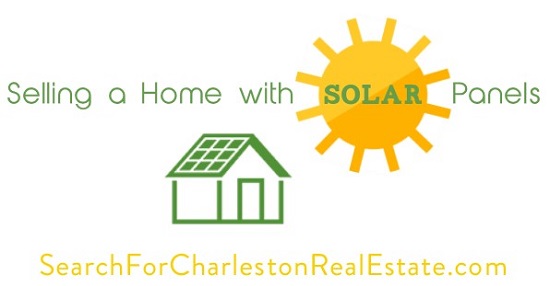
Many sellers don’t realize when they install solar panels the repercussions of trying to sell a home with existing solar. If owners pay for them outright, it’s usually not a problem. In these cases, the owners probably won’t be able to recoup all of the expenses when they go to sell the home because most buyers would rather put that money into kitchen or bathroom upgrades. From a real estate stand point, solar panels should be viewed not as an investment but as a way to save money on utility bills and lighten your carbon foot print.
The problem with solar panels here in our Charleston SC real estate market comes from the fact that most owners finance the panels instead of paying for them outright. Most buyers are not going to want to continue paying on an agreement that they did not initiate themselves. I recently represented the buyers in a case where we had come to full agreement on all terms (including price) for a home – and the solar panels ended up being a deal killer. In this example, my clients were making a $350K offer which is about the average price for a home in Charleston SC. Just doing the math on the 20 year lease at $118 a month made the equipment and interest around $28K. This cost was about double what they should cost to be installed once the tax credits were taken into consideration. In the $350K price range, having an additional $28K in costs that were not repairs, updates, or regular maintenance was understandably too much for my buyers. It was a shame that this home didn’t work out for them because they were completely sold on everything except the solar lease that was already in place.
Another common problem we’re seeing right now is that if the buyer assumes the lease payments, it adds a payment to their debt to income ratio. For buyers who are already stretching their means, this single payment can prevent them from getting the loan. Even when buyers have gotten pre-approved before making an offer to purchase, the solar panel cost was probably not originally included in their debts – which can mean their financing falls through in the underwriting process just a week or so before closing.
Also, when panels are financed, the solar panel company can file a UCC lien against the property which can create a hiccup and more paperwork when it comes time to sell the home. A good closing attorney can help address this problem, but liens can delay the closing time frame and create additional stress for both the buyer and seller when they’re unexpected.
Don’t get us wrong – solar panels can be a good investment for home owners who are going to be in their home long enough to reap the benefits. And incorporating new green technologies to a home is a goal that we should all have. However, it’s important for owners to understand how solar panels in particular can affect their home’s value and deter a sale. Be sure that you weigh the pros and cons (and understand your time frame for staying in your home) before you get them installed!